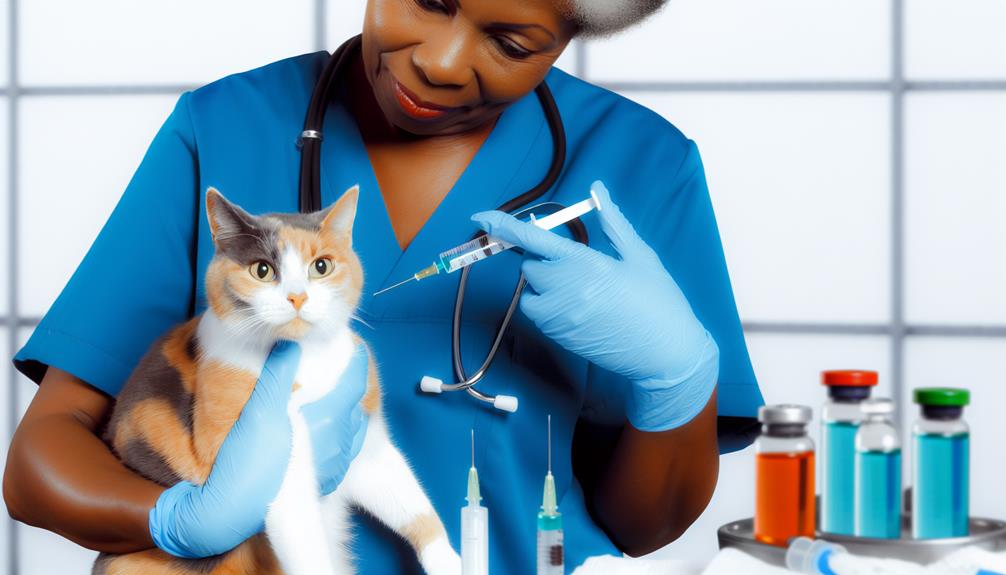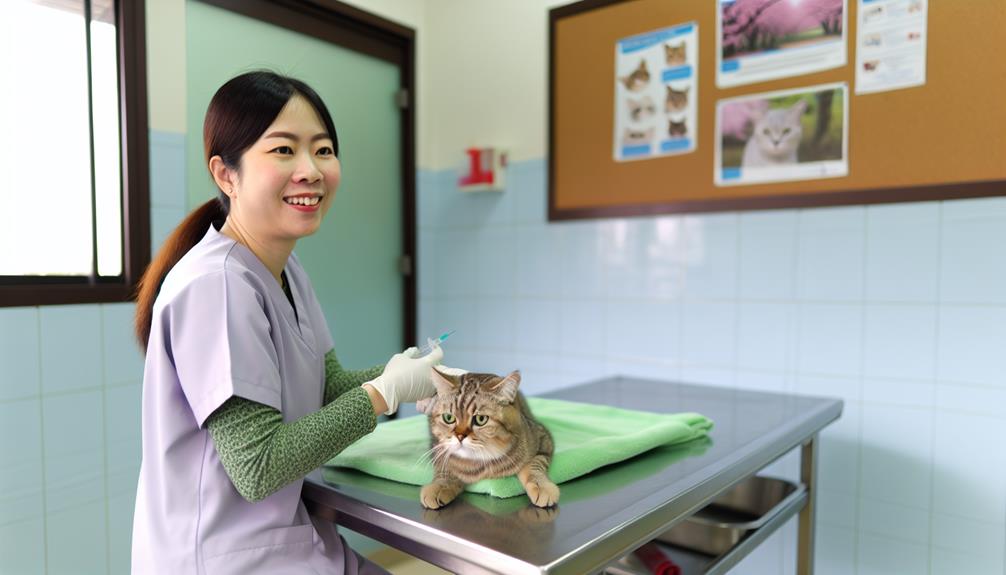Are you a responsible pet owner who wants to keep your furry friend healthy and happy? Well, one important way to do that is through cat vaccinations! These special shots can prevent serious diseases, boost your cat's immune system, and even save you money on vet bills. But that's not all! Vaccinations also protect other animals your cat might meet, and can even help them live longer. But how do these vaccines work? Let's dive into this essential guide to cat vaccinations and discover all the amazing benefits they provide. Get ready to be amazed!
Key Takeaways
Key Takeaways:
- Cat vaccinations are important for keeping your cat healthy and preventing serious diseases.
- Vaccinations boost your cat's immune system, helping them fight off infections and stay strong.
- Getting your cat vaccinated can save you money on vet bills in the long run.
- Vaccinations also prevent contagious infections from spreading to other cats.
- By getting your cat vaccinated, you're giving them a longer and happier life.
- Being a responsible pet owner means getting your cat the necessary shots to keep them safe.
Preventing Serious Feline Diseases
Why Vaccinating Your Cat is Super Important!
Did you know that by getting your cat vaccinated, you can protect them from serious diseases that could make them really sick or even cause death? Vaccines are like superheroes for your furry friends, fighting off harmful viruses and keeping them healthy. Let's take a closer look at why cat vaccinations are so crucial:
- Prevention of viral infections: Vaccines are specially designed to boost your cat's immune system and shield them from common feline viruses like feline herpesvirus, calicivirus, and panleukopenia virus. These viruses can cause all sorts of nasty symptoms, from trouble breathing and fever to tummy troubles. But with the right vaccines, your cat's immune system will be ready to take on these viruses and reduce the chances of them getting sick.
- Reducing the risk of spreading infections: Feline viruses are highly contagious, especially in homes with multiple cats or shared living spaces. But here's the good news: vaccinated cats are less likely to become carriers of these viruses and pass them on to other cats. So by vaccinating your cat, you're not only protecting them but also helping to keep the whole cat community safe and healthy.
Strengthening the Immune System
Strengthening Your Cat's Immune System: How to Keep Your Furry Friend Healthy and Happy
Did you know that you can help your cat stay healthy and protect them from diseases? It's true! By strengthening their immune system, you can give them the best chance of fighting off infections and staying well. But how can you do that? Let's find out!
- Feed your cat a balanced diet: Just like humans, cats need good nutrition to stay healthy. Make sure to give them food that is full of important nutrients, vitamins, and minerals. This will help support their immune system and keep them strong.
- Keep them hydrated: Water is essential for your cat's immune system to work properly. Make sure they always have clean and fresh water available. This will help their body function at its best.
- Get them moving: Exercise is not only important for humans but also for cats. When your cat exercises, it helps their immune cells circulate better in their body. This means they can find and destroy any bad germs that might make them sick. So, make sure to play with your cat and give them opportunities to get moving!
- Keep stress levels low: Did you know that stress can weaken your cat's immune system? It's true! To keep your cat healthy, make sure they have a calm and stable environment. Give them a safe space where they can relax, and provide plenty of mental and physical stimulation. This will help reduce their stress levels and keep their immune system strong.
- Don't forget the vet visits: Regular check-ups with the vet are super important for your cat's health. Vaccinations and preventive treatments recommended by your vet can protect your cat against specific diseases. This will further strengthen their immune system and keep them safe.
Minimizing Veterinary Expenses
How to Save Money on Your Cat's Vet Bills
Taking care of your cat's health doesn't have to break the bank! By following a few simple steps, you can minimize your veterinary expenses and keep your furry friend happy and healthy. Check out these tips:
- Regular Check-ups: Just like humans, cats need regular check-ups too! By bringing your cat to the vet for routine visits, you can catch any potential health issues early on. This helps prevent serious problems and saves you money in the long run.
- Vaccinations: Vaccinations are like superhero shields for your cat! They protect against contagious infections and help keep your cat healthy. Plus, by preventing diseases, you can avoid costly treatments and vet bills.
- Balanced Diet and Exercise: A healthy lifestyle is key to keeping your cat in tip-top shape. Feed them a balanced diet and make sure they get enough exercise. This will strengthen their immune system and reduce the chances of them getting sick.
- Pet Insurance: Just like humans have health insurance, cats can have it too! Investing in pet insurance can help cover unexpected veterinary costs. Make sure to choose a plan that fits your budget and covers the services your cat may need.
Protecting Against Contagious Infections
Why It's Important to Vaccinate Your Cat Against Contagious Infections
Did you know that contagious diseases can spread quickly among cats, causing serious illness or even death? But don't worry, there's a way to protect your furry friend – vaccination!
Here are some key points to understand why vaccinating your cat is crucial:
- Contagious diseases: Cats can get infected with viral respiratory infections like calicivirus and herpesvirus, as well as diseases like feline panleukopenia virus (FPV), feline leukemia virus (FeLV), and feline immunodeficiency virus (FIV). These diseases can be spread through contact with infected cats, sharing food or water bowls, or being in contaminated environments.
- Vaccines to the rescue: Vaccination is a great way to prevent the transmission of these diseases. Vaccines help your cat's immune system produce protective antibodies that can fight off the viruses and prevent infection.
- Protect your cat and others: By vaccinating your cat, you not only protect them from getting sick but also help stop the spread of these contagious diseases to other cats in your community.
- Follow the schedule: It's important to follow the recommended vaccination schedule provided by your veterinarian. Regular booster shots are necessary to maintain your cat's immunity against these diseases.
- Good hygiene matters: Practicing good hygiene, like washing your hands regularly and keeping your cat's litter box clean, can further reduce the risk of transmission.
Ensuring a Longer and Healthier Life
Keep Your Cat Healthy: Vaccinations, Nutrition, and Exercise!
Did you know that getting your cat vaccinated can help them live a longer and healthier life? It's true! Vaccinations protect your furry friend from serious illnesses and even death. But vaccinations aren't the only things you need to keep your cat healthy. Proper nutrition and regular exercise are also super important!
Nutrition is key to your cat's health. They have specific dietary needs that must be met. Here's what you need to know:
- A balanced diet is crucial. Your cat needs high-quality protein, essential fatty acids, vitamins, and minerals.
- The right nutrients help your cat have a strong immune system, healthy skin and coat, and good organ function.
- Talk to your vet to find the best diet for your cat.
Exercise is also essential for your cat's well-being. Check out these benefits:
- Exercise helps prevent obesity and keeps their heart healthy.
- It keeps their muscles strong and flexible.
- Exercise also stimulates their natural hunting instincts and keeps them mentally sharp.
Frequently Asked Questions
Are Cat Vaccinations Safe for All Cats, Including Older or Ill Cats?
Frequently Asked Questions:
Q: Are cat vaccinations safe for older or sick cats?
A: Yes, cat vaccinations are generally safe for older or sick cats. However, it's important to talk to a veterinarian first. They will consider the cat's health condition and create the best vaccination plan. The benefits of vaccination should be weighed against any potential risks.
Q: How do I know if my cat needs vaccinations?
A: Your veterinarian will be able to guide you on your cat's vaccination needs. They will consider factors such as your cat's age, lifestyle, and potential exposure to diseases. Regular check-ups with your vet will ensure your cat receives the necessary vaccinations.
Q: Can vaccinations harm my cat?
A: Vaccinations are designed to protect cats from diseases, but like any medical procedure, there can be some risks. However, the benefits of vaccination usually outweigh the risks. Veterinarians carefully choose vaccines that are safest for cats, and they monitor cats for any adverse reactions.
Q: What are the most common vaccinations for cats?
A: The core vaccinations that are recommended for all cats include those for feline viral rhinotracheitis, calicivirus, and panleukopenia. Additional vaccinations may be recommended based on individual factors, such as lifestyle and risk of exposure to other diseases.
Q: How often should my cat be vaccinated?
A: The frequency of vaccinations depends on various factors, including the cat's age, lifestyle, and the type of vaccine being used. In general, kittens receive a series of vaccinations starting at around 8 weeks of age, with boosters given at regular intervals. Adult cats usually need vaccinations every 1-3 years.
Q: Can my cat have an adverse reaction to vaccinations?
A: While rare, cats can have adverse reactions to vaccinations. These reactions can range from mild, such as soreness at the injection site, to more severe, such as allergic reactions. Your veterinarian will monitor your cat after vaccination and can provide guidance on how to manage any reactions that may occur.
Q: Can my cat skip vaccinations if they stay indoors?
A: Even if your cat stays indoors, they can still be at risk for certain diseases. Indoor cats can be exposed to viruses brought in by people or other pets. Additionally, if your cat ever needs to go to a boarding facility or visit the veterinarian, vaccinations may be required.
Q: Can my cat get vaccinated if they're sick?
A: In general, it is not recommended to vaccinate a sick cat. Vaccinations should be given to cats in good health to ensure their immune system can respond properly. If your cat is ill, it's best to wait until they have recovered before getting them vaccinated.
How Often Do Cats Need to Be Vaccinated to Maintain Protection Against Feline Diseases?
Frequently Asked Questions:
Q: How often do cats need to be vaccinated?
A: Cats need to be vaccinated to protect them from diseases. The frequency of vaccinations depends on the specific vaccine, the cat's age, health, and lifestyle. Some vaccines provide protection for one year, while others can last up to three years.
Q: What diseases do cat vaccines protect against?
A: Cat vaccines protect against common feline diseases like rabies, feline distemper (panleukopenia), feline herpesvirus, and feline calicivirus. These diseases can make cats very sick, so it's important to keep them protected.
Q: When should I start vaccinating my kitten?
A: Kittens should start their vaccinations when they are around 6 to 8 weeks old. They will need a series of vaccinations, usually given every 3 to 4 weeks until they are about 16 weeks old. This helps build their immunity and keeps them healthy.
Q: Do indoor cats need vaccines too?
A: Yes, even indoor cats need vaccines. While they may not be exposed to as many diseases as outdoor cats, they can still get sick. Vaccines can help protect them from diseases that can be brought in by people or other animals.
Q: Are cat vaccines safe?
A: Yes, cat vaccines are generally safe. Like any medication, there can be some side effects, but they are usually mild. Your veterinarian will discuss any potential risks with you and make sure the vaccines are appropriate for your cat's health.
Q: Can cats get vaccinated if they are sick?
A: It's best to wait until a cat is healthy before getting them vaccinated. Vaccines work by stimulating the immune system, so if a cat is already sick, their immune system may not respond as well. Your veterinarian will advise you on the best time to vaccinate your cat.
Q: Are there any alternatives to vaccines?
A: Vaccines are the best way to protect cats from diseases, but there are some alternative preventive measures. Keeping your cat indoors, feeding them a healthy diet, and regular vet check-ups can also help keep them healthy.
Q: Can older cats still get vaccinated?
A: Yes, older cats can still get vaccinated. Even if they have been vaccinated before, their immunity can decrease over time. Your veterinarian will recommend a vaccination schedule based on your cat's age and health.
Can Cats Experience Any Side Effects From Vaccinations?
Frequently Asked Questions about Vaccinations for Cats:
Q: Can cats have side effects from vaccinations?
A: Yes, cats can have some side effects from vaccinations, but they are usually not too serious. These side effects can be things like a little bit of soreness where the shot was given, or maybe feeling a little tired. But don't worry, these side effects usually go away quickly.
Q: How can we help our cat if they have a side effect from a vaccination?
A: If your cat has a side effect from a vaccination, you can help them by keeping them comfortable. Give them a cozy place to rest and maybe some extra cuddles. It's also important to keep an eye on them for any severe or long-lasting reactions, just to be safe.
Q: Are the side effects from cat vaccinations dangerous?
A: Most of the time, the side effects from cat vaccinations are not dangerous. They are usually mild and go away on their own. However, in very rare cases, some cats may have a more serious reaction. That's why it's important to watch for any signs of severe or prolonged reactions and let your vet know if you're concerned.
Q: Can cats get sick from vaccines?
A: Vaccines are actually given to cats to help them stay healthy and prevent them from getting sick. While it's possible for a cat to have a mild reaction to a vaccine, it's much less likely for them to get sick from the vaccine itself. Vaccines are designed to protect cats from harmful diseases.
Q: Can kittens get vaccinations too?
A: Yes, kittens can and should get vaccinations too! Just like with human babies, it's important to start protecting kittens from diseases when they are young. Your vet will give you a schedule for when your kitten should get their vaccinations, usually starting around 8 weeks old.
Are There Any Alternative Options to Cat Vaccinations for Preventing Diseases?
Frequently Asked Questions:
Q: Can natural remedies and homeopathic alternatives prevent diseases in cats?
A: While some people may try natural remedies, it's important to know they may not offer the same level of protection as vaccinations. Vaccinations are specially designed to prevent specific diseases in cats and are recommended by veterinarians for their effectiveness.
Q: Why do some people consider natural remedies for their cats?
A: Some pet owners may explore natural remedies because they prefer a more holistic approach to their cat's healthcare. They may believe that natural remedies have fewer side effects or are more aligned with their personal beliefs. However, it's crucial to consult with a veterinarian before trying any alternative treatments.
Q: Are natural remedies as effective as vaccinations?
A: No, natural remedies are generally not as effective as vaccinations. Vaccinations are carefully developed to stimulate a cat's immune system and provide long-lasting protection against specific diseases. Natural remedies, on the other hand, may have limited scientific evidence supporting their effectiveness.
Q: What are the risks of relying solely on natural remedies?
A: Relying solely on natural remedies may put your cat at risk of contracting preventable diseases. Vaccinations have been proven to be highly effective in preventing diseases, while natural remedies may not provide the same level of protection. It's essential to discuss with a veterinarian to ensure your cat's health and well-being.
Q: Can natural remedies be used alongside vaccinations?
A: It's important to consult with a veterinarian before using any natural remedies alongside vaccinations. Some remedies may interfere with the effectiveness of vaccines or have potential side effects. Your veterinarian can provide guidance and ensure your cat's health is not compromised.
Q: What should I do if I want to explore natural remedies for my cat?
A: If you're interested in natural remedies for your cat, it's crucial to consult with a veterinarian first. They can provide guidance on the safety and effectiveness of different remedies. Remember, the health and well-being of your cat should always be a top priority, and your veterinarian is the best source of advice.
Q: Are there any natural alternatives that can help boost a cat's immune system?
A: While natural remedies may not replace vaccinations, some supplements or dietary changes may help support a cat's immune system. However, it's important to consult with a veterinarian before making any changes to your cat's diet or adding supplements. They can provide personalized advice based on your cat's specific needs.
What Should I Do if My Cat Misses a Scheduled Vaccination?
Frequently Asked Questions about Missed Cat Vaccinations:
Q: What should I do if my cat misses a scheduled vaccination?
A: If your cat misses a vaccination, it's important to talk to your vet. They will tell you how to catch up on the missed shots and what to do if your cat has a bad reaction to a vaccination.
Q: Why is it important for cats to get vaccinated?
A: Vaccinations help protect cats from serious diseases. They train the cat's immune system to fight off harmful germs, keeping them healthy and safe.
Q: Can my cat still get vaccinated if they missed a shot?
A: Yes, your cat can still get vaccinated even if they missed a shot. Your vet will create a plan to catch up on the missed vaccines and make sure your cat stays protected.
Q: What happens if my cat has a bad reaction to a vaccination?
A: Sometimes, cats can have a bad reaction to a vaccination. If this happens, it's important to contact your vet right away. They will know what to do to help your cat feel better.
Q: Are there any side effects of vaccinations for cats?
A: Like with any medicine, there can be some side effects to cat vaccinations. Most cats don't have any problems, but some may experience mild symptoms like soreness or a low fever. These usually go away on their own.
Q: How often do cats need to be vaccinated?
A: Cats need to be vaccinated regularly to stay protected. The schedule for vaccinations depends on your cat's age and the specific vaccines they need. Your vet will create a plan that's right for your cat.
Q: Can I give my cat vaccinations at home?
A: It's not recommended to give your cat vaccinations at home. Vaccinations should be done by a veterinarian who knows the right doses and techniques to keep your cat safe.
Q: What diseases do cat vaccinations protect against?
A: Cat vaccinations protect against diseases like rabies, feline leukemia, distemper, and respiratory infections. These diseases can be serious and even life-threatening for cats.
Q: Will my cat need vaccinations every year?
A: Some vaccinations need to be given every year, while others may be given every few years. Your vet will create a schedule based on your cat's needs to make sure they stay protected.
Q: Can indoor cats skip vaccinations?
A: Even indoor cats should be vaccinated. While they may have a lower risk of exposure to diseases, there's still a chance they could come into contact with harmful germs. Vaccinations help keep them safe.
Conclusion
To sum it up, cat vaccinations are super important for keeping your feline friend healthy. They prevent serious diseases, boost the immune system, and save you money on vet bills. Plus, they stop contagious infections from spreading to other cats. So, by getting your cat vaccinated, you're giving them a longer and happier life. Remember, being a responsible pet owner means getting those shots! Share your thoughts or learn more about vaccinations in the comments below. Keep your fur baby safe!




